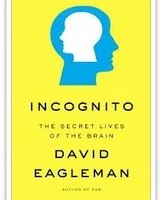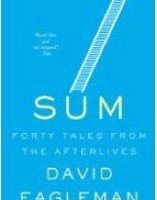I seem to keep coming across areas where neuroscience and philosophy overlap on the subject of the self. PS: The “I” at the beginning of that sentence? Just an illusion.
Tag Archives: David Eagleman
Different kinds of minds
Two of my favorite authors (David Eagleman and Kevin Kelly) discussing two of my favorite topics (AI and the mind). Mr. Kelly was thinking/writing about this way back in 2017.
What Is Consciousness?
I don’t remember when or how I became interested in consciousness. My reading has included some titles by neuroscientists (like David Eagleman) but I tend to lean toward the philosophical or contemplative (metaphysical?). Most of which has been excerpted here (110 posts!) For my money, David Eagleman explains (discusses) this slippery subject better than anyone.
I struggled with how to describe my interest in the non-scientific approaches to consciousness so I asked ChatGPT:
A good term that bridges the gap between the scientific and the mystical without leaning too far in either direction might be “philosophical” or “phenomenological.”
- Philosophical – This captures the deep inquiry into consciousness that isn’t bound by empirical science but also doesn’t necessarily invoke mysticism. Thinkers like Descartes, Husserl, and Chalmers explore consciousness through reason, introspection, and logic.
- Phenomenological – A term used to describe the study of subjective experience, focusing on how consciousness feels from the inside. This is rooted in philosophy but can also align with contemplative practices.
- Existential – A term often associated with the nature of experience, selfhood, and the human condition, which naturally touches on consciousness.
- Contemplative – While sometimes associated with spiritual traditions, it can be neutral enough to imply deep, reflective examination of awareness without invoking religious connotations.
If you’re looking for something even broader, “metaphysical” works, though it might feel too abstract.
Why Do Your 30 Trillion Cells Feel Like a Self?
I first became aware of David Eagleman in 2011 as the author of a little book titled Sum: Forty Tales from the Afterlives. Which led me to his book Incognito: The Secret Lives of the Brain As luck would have it, he gave a lecture later that year at nearby Westminster College (How the Internet Will Save the World: Six Easy Steps to Avert the Collapse of Civilizations) which I found fascinating. So when I discovered his weekly podcast I was quick to check it out and discovered he has done a deep dive into one of my favorite topics: the illusion of the self. (73 blog posts) Why Do Your 30 Trillion Cells Feel Like a Self? Part 1 & Part 2
What Is A Thought?
I have been fascinated by this question –and its many answers– for years. Forty-one posts (this makes 42). Additionally, I’m a fan of David Eagleman (tag link below). In the podcdast below he attempts to answer the question, What Is A Thought?
Couple of things about this video I found noteworthy:
- Dr. Eagleman appears to be speaking extemporaneously. I suppose he could be reading from a prompter but it doesn’t sound/look like it. If not, what an amazing skill.
- The brief video clips used to illustrate some of the ideas presented appeared to be AI generated. A little over-the-top but effective nonetheless.
- Where would I have found a clear, coherent presentation by a noted neuroscientist on this topic before YouTube? Certainly not on network or cable TV. A college classroom (if you could afford to go) I suppose.
What is time to the brain?
David Eagleman at the FQXi SETTING TIME ARIGHT conference (2011), an interdisciplinary meeting investigating the nature of time.
My favorite line from his talk: “We are moving creatures that run on batteries.”
Reading list: Consciousness
- The Big Picture: On the Origins of Life, Meaning, and the Universe Itself – Sean Carroll | My notes
- Consciousness and the Social Brain – Michael S. A. Graziano | My notes
- What Technology Wants – Kevin Kelly | My notes
- The Ego Trick – Julian Baggini | My Notes
- The Self Illusion: How the Social Brain Creates Identity – Bruce Hood | My Notes
- Thinking, Fast and Slow – Daniel Kahneman | My notes
- Incognito: The Secret Lives of the Brain – David Eagleman | My notes
- The Ego Tunnel: The Science of the Mind and the Myth of the Self – Thomas Metzinger | My notes
- Quantum Enigma: Physics Encounters Consciousness – Bruce Rosenblum | My notes
- Biocentrism: How Life and Consciousness Are the Keys to Understanding the True Nature of the Universe – Robert Lanza | My notes
How the Internet Will Save the World
Dr. David Eagleman gives lecture titled How the Internet Will Save the World: Six Easy Steps to Avert the Collapse of Civilizations. Rome, the Mayans… lots of great civilizations assumed they would go on forever. Just as we do. Eagleman shows you this is not necessarily the case.
Incognito – The Secret Lives of the Brain by David Eagleman
It’s easy to think of “me” has “having” a brain, but this book left me thinking my brain has me. If there is a me apart from my brain, I fear it’s mostly along for the ride. Here are some ideas that brought out my highlighter.
 The brain generally does not need to know most things; it merely knows how to go out and retrieve the data. It computes on a need-to-know basis. pg 28
The brain generally does not need to know most things; it merely knows how to go out and retrieve the data. It computes on a need-to-know basis. pg 28
You’re not perceiving what’s out there. You’re perceiving whatever your brain tells you. pg 33
We have no access to the rapid and automatic machinery that gathers and estimates the statistics of the world. pg 34
Your brain is in the dark but your mind constructs light. pg 40
The difference between being awake and being asleep is merely that the data coming in from the eyes anchors the perception. Asleep vision (dreaming) is perception that is not tied down to anything in the real world; waking perception is something like dreaming with a little more commitment to what’s in front of you. pg 45
It’s easy to spot a hallucination only when it’s bizarre. For all we know, we hallucinate all the time. pg 46
Our expectations influence what we see. There has to be a match between your expectations and the incoming data for you to “see” anything. Awareness of your surroundings occurs only when sensory inputs violate expectations. pg 48, 50
The brain refines its model of the world by paying attention to its mistakes. pg 49
The brain tries to see the world only as well as it needs to. We are not conscious of most things until we ask ourselves questions about them. What we perceive in the outside world is generated by parts of the brain to which we do not have access. pg 54
Instead of reality being passively recorded by the brain, it is actively constructed by it. pg 82
There are thoughts you cannot think. pg 82
Evolution has carefully carved your eyes, internal organs,sexual organs, and so on — and also the character of your thoughts and beliefs. pg 82
“In general, we’re least aware of what our minds do best.” — Marvin Minsky, The Society of Mind
We are not able to see the instincts that are the very engines of our behavior. These programs are inaccessible to us not because they are unimportant, but because they’re critical. Conscious meddling would do nothing to improve them. pg88
Briefly glimpsed people are more beautiful. pg 92
We come to know our own attitudes and emotions, at least partially, by inferring them from observations of our own behavior. pg 134
David Eagleman is neuroscientist at Baylor College of Medicine, where he directs the Laboratory for Perception and Action.
Sum: Forty Tales from the Afterlives
 I’m reading a wonderful little book by David Eagleman called Sum: Forty Tales from the Afterlives. But it’s really “an examination of what it means to live.” At first I marveled at the strangeness of some of the stories but realized none are stranger than the stories most of us grew up with (Bearded white man sitting on golden throne surrounded by harp playing angels). This is a book I’ll keep close and read again and again.
I’m reading a wonderful little book by David Eagleman called Sum: Forty Tales from the Afterlives. But it’s really “an examination of what it means to live.” At first I marveled at the strangeness of some of the stories but realized none are stranger than the stories most of us grew up with (Bearded white man sitting on golden throne surrounded by harp playing angels). This is a book I’ll keep close and read again and again.
UPDATE (6/18/11): I’m trying to savor these stories and make them last but I’m getting near the end and everyone is better than the one before. One of my favorites so far is Death Switch:
“So an afterlife does not exist for us per se, but instead an afterlife occurs for that which exists between us. When and alien civilization eventually bumps into Earth, they will immediately be able to understand what humans were about, because what will remain is the network of relationships: who loved whom, who competed, who cheated,who laughed together over road trips and holiday dinners. Each person’s ties to bosses, brothers ad lovers are etched into the electronic communiques. The death switches simulate the society so completely that the entire social network is reconstructable. The planet’s memories survive in zeros and ones.”
Author and broadcaster Stephen Fry reads from Sum: Forty Tales from the Afterlife, neuroscientist David Eagleman’s first work of fiction.
